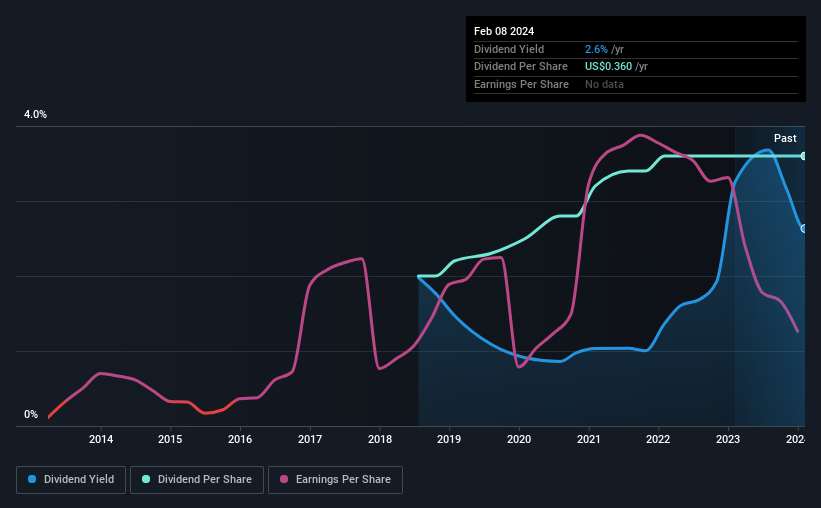AudioCodes (NASDAQ:AUDC) Has Affirmed Its Dividend Of $0.18
AudioCodes Ltd. (NASDAQ:AUDC) has announced that it will pay a dividend of $0.18 per share on the 6th of March. Based on this payment, the dividend yield will be 2.6%, which is fairly typical for the industry.
While the dividend yield is important for income investors, it is also important to consider any large share price moves, as this will generally outweigh any gains from distributions. Investors will be pleased to see that AudioCodes' stock price has increased by 39% in the last 3 months, which is good for shareholders and can also explain a decrease in the dividend yield.
See our latest analysis for AudioCodes
AudioCodes Is Paying Out More Than It Is Earning
Unless the payments are sustainable, the dividend yield doesn't mean too much. Before making this announcement, the company's dividend was much higher than its earnings. It will be difficult to sustain this level of payout so we wouldn't be confident about this continuing.
Earnings per share is forecast to rise by 46.8% over the next year. If the dividend continues on its recent course, the payout ratio in 12 months could be 100%, which is a bit high and could start applying pressure to the balance sheet.
AudioCodes Doesn't Have A Long Payment History
AudioCodes' dividend has been pretty stable for a little while now, but we will continue to be cautious until it has been demonstrated for a few more years. The dividend has gone from an annual total of $0.20 in 2018 to the most recent total annual payment of $0.36. This means that it has been growing its distributions at 10% per annum over that time. The dividend has been growing rapidly, however with such a short payment history we can't know for sure if payment can continue to grow over the long term, so caution may be warranted.
Dividend Growth May Be Hard To Come By
Some investors will be chomping at the bit to buy some of the company's stock based on its dividend history. Let's not jump to conclusions as things might not be as good as they appear on the surface. Over the past five years, it looks as though AudioCodes' EPS has declined at around 9.6% a year. If earnings continue declining, the company may have to make the difficult choice of reducing the dividend or even stopping it completely - the opposite of dividend growth. It's not all bad news though, as the earnings are predicted to rise over the next 12 months - we would just be a bit cautious until this can turn into a longer term trend.
AudioCodes' Dividend Doesn't Look Great
Overall, while some might be pleased that the dividend wasn't cut, we think this may help AudioCodes make more consistent payments in the future. The company isn't making enough to be paying as much as it is, and the other factors don't look particularly promising either. Overall, the dividend is not reliable enough to make this a good income stock.
Market movements attest to how highly valued a consistent dividend policy is compared to one which is more unpredictable. At the same time, there are other factors our readers should be conscious of before pouring capital into a stock. To that end, AudioCodes has 2 warning signs (and 1 which doesn't sit too well with us) we think you should know about. Looking for more high-yielding dividend ideas? Try our collection of strong dividend payers.
Have feedback on this article? Concerned about the content? Get in touch with us directly. Alternatively, email editorial-team (at) simplywallst.com.
This article by Simply Wall St is general in nature. We provide commentary based on historical data and analyst forecasts only using an unbiased methodology and our articles are not intended to be financial advice. It does not constitute a recommendation to buy or sell any stock, and does not take account of your objectives, or your financial situation. We aim to bring you long-term focused analysis driven by fundamental data. Note that our analysis may not factor in the latest price-sensitive company announcements or qualitative material. Simply Wall St has no position in any stocks mentioned.

